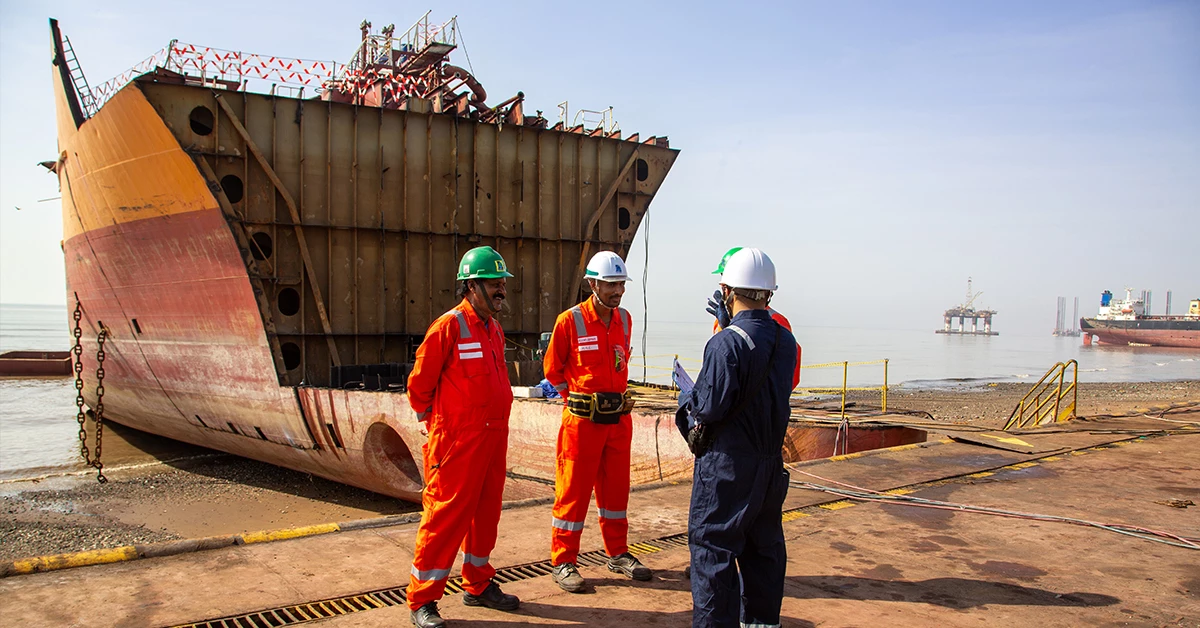Global Ship Recycling Market Enters a Gloomy October as Prices- Supply and Sentiment Decline
As October begins, the global ship recycling market has entered what industry watchers are calling a “spooky season,” with warning signs flashing across currencies, commodities, and recycling destinations. According to GMS’s latest weekly report, Week 41 of 2025 has opened on a bleak note, marked by inflationary pressures, falling oil prices, and a continued scarcity of tonnage that has left ship recyclers struggling to stay afloat.

Inflation data from major recycling hubs, including Turkey and Pakistan, indicate a rise through September, setting a grim tone for October. Both countries are experiencing mounting cost pressures just as global currencies slide and oil prices tumble. The trading markets have also been rattled, recording their steepest decline since January 2025 — a sharp 16% fall in the index over the week.
Oil, which plays a vital role in influencing both shipping and recycling markets, has taken a severe beating. Prices have dropped toward USD 60 per barrel — nearly 20% lower than this time last year. This slide has also rippled into freight indices for capesize, panamax, and supramax vessels, all of which have weakened further. Unsurprisingly, steel plate prices across recycling destinations have mirrored the downturn. India, in particular, continues to suffer the steepest declines, its prices slipping further amid weak demand and a deteriorating currency.
The ship recycling sector, especially across the Indian subcontinent, has found itself trapped in this gloomy scenario. Recyclers in India, Bangladesh, and Pakistan report falling numbers of vessel arrivals at their anchorages, with most yards operating far below capacity. Many are holding out for a long-awaited recovery that remains elusive. The year 2025 has turned out to be one of the most difficult in over a decade for the industry — with fundamentals, supply, and sentiment all declining in unison.
“Yards are running at minimum activity levels, and recyclers are wondering when things might turn around,” the GMS report notes. The implementation of the Hong Kong Convention (HKC) for safe and environmentally sound ship recycling, which came into force in June 2025, has added another layer of complexity. While it aims to improve standards and sustainability, the new compliance obligations and certification delays have burdened many yards, especially those already struggling with a lack of business.
“After years of operating as a well-oiled machine, the ship recycling industry is now tangled in red tape and slow approvals,” said one Alang-based recycler quoted in the report.
Adding to the frustration is the shortage of tonnage. The limited number of ships heading for demolition has left recyclers competing fiercely for what little supply remains. Yet, the fleet itself is aging — with the average age of vessels now exceeding 30 years — and newbuild deliveries continuing from global shipyards. This suggests that a wave of older ships could enter the recycling market in the coming years, possibly around 2027, but until then, the market remains stagnant.
On the regional front, Bangladesh is showing signs of recovery, with 18 HKC-approved yards and three more expected to join the list this month. Pakistan, however, still lags behind in obtaining HKC approvals, though its Gadani yards are reportedly upgrading their facilities. Despite the delay, Pakistan currently holds a pricing advantage, supported by provisional DASR certificates that allow it to maintain competitiveness for incoming tonnage.
India’s troubles, meanwhile, continue to deepen. A weak rupee, sliding steel prices, and sluggish buying activity have eroded market confidence. “The sentiment ship has sunk,” the GMS report remarked wryly, summarizing India’s condition through September. Alang’s once-bustling yards are now described as “all dressed up with nowhere to go.”
Turkey’s recycling sector, which once benefited from a steady inflow of tonnage from European ports, has gone noticeably quiet. Yards remain open for ships from Western sources, but the rest of the world seems absent from Turkish markets. Economic headwinds, including rising inflation and currency depreciation, have further weakened sentiment there.
Adding a touch of intrigue to an already turbulent landscape is a new development: reports suggest that over 300 containers may soon be designated as part of a “grey fleet” — a term that has raised eyebrows among recyclers and regulators alike, though details remain limited.
For Week 40 of 2025, GMS’s market rankings show Pakistan leading the recycling scene with relatively stable prices, followed by India and Bangladesh, both marked as weak markets. Turkey trails far behind.
GMS Market Rankings – Week 40, 2025:
-
Pakistan: Steady – USD 420 (Dry Bulk) / 440 (Tankers) / 450 (Containers) per LDT
-
India: Weak – USD 410 / 430 / 440 per LDT
-
Bangladesh: Weak – USD 400 / 420 / 430 per LDT
-
Turkey: Weak – USD 250 / 260 / 270 per LDT
As the industry enters the final quarter of the year, the outlook remains grim. Falling oil prices, softening steel values, and persistent economic uncertainty have all contributed to the chill. While recyclers hope for a turnaround, October appears to have started with more tricks than treats.
Author: shipping inbox
shipping and maritime related web portal









